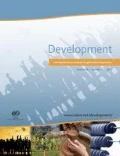Abstract
The purpose of this article is to raise a question rather than to provide an answer. The topic of the question is the sudden popularity of the term ‘innovation’ in the development discourse – even though the term is used in a fuzzy manner, and without any attempt at agreeing on a clear definition. To interpret the impact of this term, I draw attention to two other terms that were prominent in the development literature at earlier times: Big Push and Post-Development. Early on, a Big Push was presented as the solution for underdeveloped countries; it became more than a concept, as a code word for the aid industry. Failure and lasting challenges generating several critiques, of which I single out Post-Development theory as the one that challenged both the paradigm and the performance of mainstream development. This article seeks to provoke a discussion of whether innovation is the new orthodoxy, that is, the pursuit of conventional development by other means, or whether it has the potential of forming a new critique, a basis for rethinking and recasting development.
Similar content being viewed by others
Notes
Sachs still defends the need and theory of the Big Push.
References
Abuzeid, Farah (2009) ‘Foreign Aid and the “Big Push” Theory: Lessons from sub-Saharan Africa’, Stanford Journal of International Relations XI (1): 16–23.
Betts, Alexander, Louise Bloom and Naohiko Omata (2012) ‘Humanitarian Innovation and Refugee Protection’, Working Paper Series No 85, Refugee Studies Centre, Oxford University.
DfID (2011) The Engine of Development: The private sector and prosperity for poor people. London: DfID.
Easterly, William and Jeffrey Sachs (2006) ‘The Big Push Déjà Vu: A review of Jeffrey Sachs’s the end of poverty: Economic possibilities for our time’, Journal of Economic Literature 44 (1): 96–105.
HLF4 (2011) Busan High Level Forum on Aid Effectiveness: Proceedings. Busan, Korea.
Nederveen Pieterse, Jan (2000) ‘After post-development’, Third World Quarterly 21 (2): 175–191.
OECD/Eurostat (2008) Oslo Manual, The Measurement of Scientific and Technological Activities, Guidelines for Collecting and Interpreting Innovation Data, Third edition, http://epp,eurostat,ec,europa,eu/cache/ITY_PUBLIC/OSLO/EN/OSLO-EN,PDF, accessed 1 March 2013.
Rosenstein-Rodan, Paul (1943) ‘Problems of Industrialization of Eastern and South-Eastern Europe’, Economic Journal 53 (210/211): 202–211.
Sachs, Jeffrey (2005) The End of Poverty: Economic possibilities for our time. New York: Penguin Press HC.
SCG (Search for Common Ground) (2013) Participatory Theatre for Conflict Transformation, Training Manual, http://www.sfcg.org/programmes/drcongo/pdf/Participatory-Theatre-Manual-EN,pdf, accessed 3 January 2013.
UNHCR (2012) UNHCR Promotes Innovation and Self Sufficiency at Annual NGO Meet, Making a Difference, 3 July, http://www.unhcr.org/4ff300320,html, accessed 2 February 2013.
UNICEF (2010) Annual Report for Uganda of 2010, http://www.unicef.org/about/annualreport/files/Uganda_COAR_2010,pdf, accessed 1 March 2013.
UNICEF (2013a) Innovation, http://www.unicefinnovation.org/frequently-asked-questions#sthash,PsWI8HEf,dpuf, accessed 1 March 2013.
UNICEF (2013b) About Us, http://www.unicefinnovation.org/about-us, accessed 1 March 2013.
Ziai, Aram (2007) ‘Development Discourse and Its Critics, An Introduction to Post-Development’, in Aram Ziai (ed.) Exploring Post-Development, Theory, Practice, Problems and Perspectives, pp 3–17, London: Routledge.
Additional information
The idea of innovation has become popular, but it remains a contested terrain. While it can provide an entrée for a new basis for rethinking and recasting development, it can also become a basis for defending the status quo
Rights and permissions
About this article
Cite this article
Krause, U. Innovation: The new Big Push or the Post-Development alternative?. Development 56, 223–226 (2013). https://doi.org/10.1057/dev.2013.29
Published:
Issue Date:
DOI: https://doi.org/10.1057/dev.2013.29




